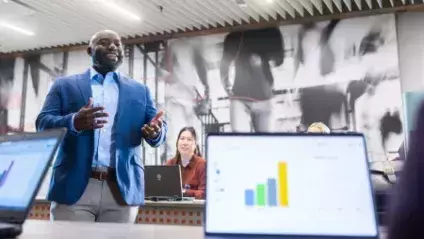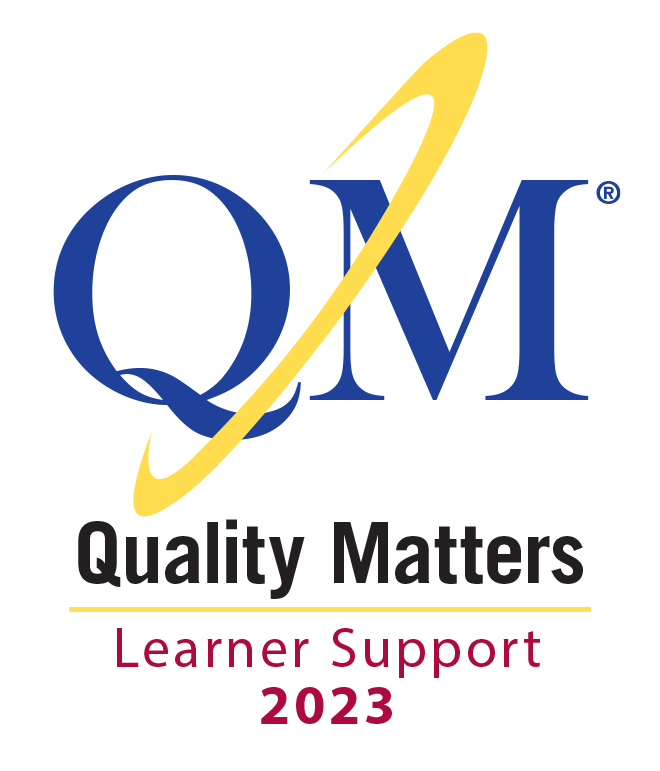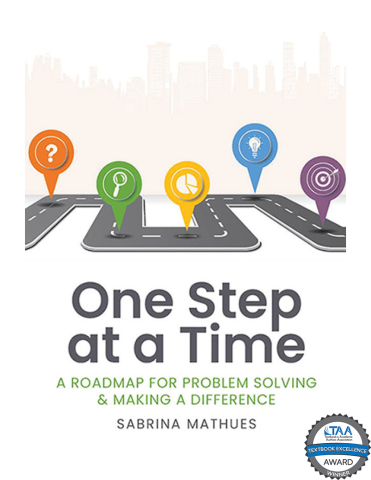Questions? Request Information
Build Next-Level Nursing Skills
In the rapidly changing health care field, the need for highly prepared and educated nurses is at a premium. The online RN to BSN program at the University of Arizona Global Campus (UAGC) provides registered nurses the education they need to stand out from the competition.
By earning your CCNE-accredited Bachelor of Science in Nursing online, you will develop your technology skills, along with the personal skills required to meet the needs of the patient population. You may also gain the educational experience to take on more responsibilities and pursue management level roles that often require this in-depth training.
As a graduate of the RN to BSN program, you will be prepared to practice nursing using advocacy, autonomy, accountability, ethics, and respect. Upon completion of the BSN, you will be able to:
- Apply nursing leadership concepts and skills to promote quality care and patient safety across a variety of health care settings
- Apply (a) current evidence, (b) critical thinking, and (c) assessment skills to professional nursing practice
- Use technological and informatics systems related to health care to promote quality patient care
- Synthesize local and federal policies that affect health, health care delivery, and health care management
- Use inter-professional communication and collaborative skills to communicate with and educate peers, health care professionals, patients and their families, and the community
- Assess health and wellness beliefs and practices to promote health and disease prevention among individuals, families, groups, communities, and populations
- Articulate the value of pursuing practice excellence, through lifelong learning and engagement, to grow professionally
- Integrate holistic nursing knowledge, values, skills, and attitudes into practice across the lifespan and continuum of health care environments
UAGC Award-Winning Curriculum
Military Students $250.00/credit
Undergraduate Courses $460.00/credit
Technology Fee** $115.00/course
Books and Other Class Materials** $125.00/average per course
Graduation Fee $150.00
Total Program Cost See UAGC Catalog¹
¹Keep in mind that this figure doesn’t factor in any potential discounts, partner benefits, or impact of accepted transfer credits, if eligible.

UAGC offers enrolled students access to ScholarshipUniverse, a platform that tailors external scholarship opportunities to your unique situation, making it easier to find and apply for scholarships.
UAGC is proud to provide reduced tuition rates for our academic and corporate partners, helping community college transfer students and corporate employees earn their degrees at a lower cost.


Online RN to BSN Program Curriculum Overview
Your RN to BSN courses will foster your personal development – building self-confidence, ethical values, integrity – while cultivating your professional knowledge of technologies and modalities to effectively communicate with patients and their families. Your coursework and practice experiences cover a wide range of content, from patient care quality and safety to leadership, community health, ethics, and technology. In your practice experiences, you will acquire knowledge and skills by interacting with healthcare professionals and engaging in rich learning simulations. You will also focus on developing and refining interprofessional, leadership, and assessment in intervention skills.
You must earn a minimum cumulative grade point average of 2.50 in all major coursework attempted at the University. To earn your Bachelor of Science in Nursing (RN to BSN) at UAGC, you must complete 120 credits. You will need to complete 30 upper-division credits, of which 18 credits must be from the major program. A total of 30 credits must be completed at UAGC to meet the residency requirement. You may be able to transfer approved credits from community colleges, other previous college coursework, or other life experiences such as military service or job training toward your degree.
*Students in the Bachelor of Science in Nursing program at the University of Arizona Global Campus may be eligible to receive up to 20 non-traditional elective credits through Prior Learning Assessment for completing the NCLEX-RN exam. Students should wait until all previous post-secondary coursework has been reviewed and then contact their Academic Advisor to determine if there is a need for the exam to be reviewed for college credit. To request the credit to be applied, students must complete the Application for NCLEX-RN Exam Credit (provided by the Academic Advisor), write a 1-3 page essay, and submit both documents to pla@uagc.edu.
Special Terms and Conditions
Applicants to this program must have earned a nursing (hospital) diploma or associate degree in nursing from an approved accredited college or university including the following coursework or equivalent: Microbiology (with lab).
Applicants must possess an active, unrestricted license to practice as a Registered Nurse (RN) in at least one U.S. state. All students must maintain this licensure throughout the program of study. Failure to do so will result in dismissal from the program. Students are responsible for informing the University of Arizona Global Campus of any change to the status of their RN license. In addition, UAGC may perform routine, periodic validations of student RN licenses to ensure compliance with this requirement.
California Students: Applicants must possess an active, unrestricted license to practice as a Registered Nurse (RN) in the state of California. All students must maintain this licensure throughout the program of study. Failure to do so will result in dismissal from the program. Students are responsible for informing the University of Arizona Global Campus of any change to the status of their RN license or their state of residence. In addition, UAGC may perform routine, periodic validations of student RN licenses to ensure compliance with this requirement.
In order to transfer credits for NUR courses in the Bachelor of Science in Nursing program, the credits to be transferred must come from a school or program accredited by Accreditation Commission for Education in Nursing (ACEN) or Commission on Collegiate Nursing Education (CCNE).
Licensure and Certification Terms and Conditions
This program is not designed to meet the state educational requirements for a specific professional license or certification in any state. Students seeking licensure or certification in a particular profession shall carefully research the requirements prior to enrollment and regularly review the requirements as they are subject to change. Requirements vary by state. The University of Arizona Global Campus does not guarantee that any professional organization will accept a graduate’s application to sit for any exam for the purpose of professional certification. Further, a criminal record may prevent an applicant from obtaining licensure, certification, or employment in their field of study.
Alabama Students: Approval of a program to offer Alabama licensed nurses opportunities for advanced degrees does not indicate eligibility for approval to practice as an advanced practice nurse in Alabama. Applicants for approval in Alabama are required to meet the Alabama requirements for national certification, graduation from a specific-type program for the advanced practice approval, and completion of the appropriate application. Any program offering a pre-licensure track to Alabama students shall meet the requirements of the Alabama regulations for pre-licensure programs or the graduates may not be eligible to take the national licensure examination required by the Alabama Board of Nursing (https://www.abn.alabama.gov/ ) to enter the practice.
Practice Experiences in the RN-BSN Program
The RN-BSN program requires sixty (60) hours of Practice Experience activities. Practice Experiences involve various activities, including direct (in-person) and indirect care experiences at a clinical site. Students must complete the Practice Experience activities in each course before they can complete it and earn a passing grade.
For more details, please review the Practice Experience Guide.
The RN to BSN is not available in all states. Students can only complete the RN to BSN in states where the program is available. If a student moves to a state or country where the RN to BSN is not available after admission into the program, it may impact whether the student can remain in the degree program, continue to receive financial aid funding, and/or complete the required Practice Experience.
Students enrolling in a degree program with a Practice Experience requirement are expected to complete the Practice Experience in the United States and may be required to be available during standard U.S. time zones. If students anticipate that they will not be able to complete their Practice Experience in the United States, all exceptions must be approved prior to admission into the program. Students who reside and/or work outside the United States will be ineligible to complete Practice Experience hours at a facility abroad.
The mission of the RN to BSN program is to prepare registered nurses to further develop their ability to lead and provide compassionate, competent patient care to diverse populations across the lifespan using evidence-based practice.
The Online Teaching Support Certification recognizes programs that require all online faculty to undergo training in best practices for online course delivery, provide faculty with ongoing pedagogical support, encourage faculty professional development to increase their knowledge and skill in online teaching, emphasize instructor availability and feedback to learners, and collect and use feedback from learners to improve online teaching. Learn More

The Online Learner Support Certification recognizes programs that provide all the critical student and academic services needed for learner success and use learner feedback to continuously improve those services.

What Can I Do with a Bachelor of Science in Nursing Online Degree?
The online RN to BSN degree program provides the associate’s degree or diploma-prepared registered nurse (RN) an opportunity to enhance and advance their professional career. Students that successfully complete the program may pursue career opportunities such as:
- Charge Nurse
- Preceptor
- Emergency Department RN
- Oncology RN
- Operating Room Registered Nurse
- Psychiatric RN
- Relief Charge Nurse
- School Nurse
- Staff Nurse
- Staff RN
Gain insights into the nursing job market by reviewing the Bureau of Labor Statistics market outlook report.
This degree was perfect for me. The advisors were so very helpful, and the classes were very informative. I definitely got my money's worth.
RN to BSN Program FAQs
-
An RN to BSN program is an educational pathway designed for registered nurses with an Associate Degree in Nursing (ADN) or diploma to earn a Bachelor of Science in Nursing. It builds upon their existing nursing knowledge and experience, providing a more comprehensive education in areas like leadership, research, and community health.
-
Enrolling in an RN to BSN program online can be a worthwhile investment for nurses as it may lead to career enhancement opportunities and increased job satisfaction. Many health care organizations prefer or require nurses to have a BSN, making it a valuable credential in the competitive nursing field. We recommend you speak with an Enrollment Advisor about your career goals to see if this program is right for you.
-
Your RN to BSN courses will foster your personal development – building self-confidence, ethical values, integrity – while cultivating your professional knowledge of technologies and modalities to effectively communicate with patients and their families. Your coursework and practice experiences cover a wide range of content, from patient care quality and safety to leadership, community health, ethics, and technology.
In your practice experiences, you will acquire knowledge and skills by interacting with health care professionals and engaging in rich learning simulations. You will also focus on developing and refining interprofessional, leadership, and assessment in intervention skills.
-
Health care in the U.S. is becoming more and more complex, as many nurses need to step into managerial and leadership roles. Many hospitals are making it their policy to require their nurses to have a minimum of a BSN or at least an agreement to pursue that degree within a period of time. According to the American Association of Colleges of Nursing, all magnet hospitals require their managers to have a minimum of a BSN or MSN. The current nursing environment is becoming more competitive, which means earning a Bachelor of Science in Nursing is now more critical than ever before.
See What Else UAGC Has to Offer
Questions? Request More Information
To access this rate using the Liberty Grant, only eligible undergraduate active duty service members, members of the National Guard, Reservists, spouses of active duty, members of the National Guard and Reservists, Department of Defense employees using Tuition Assistance (TA), and civilian employees of the United States Coast Guard (only if utilizing Military Tuition Assistance) will qualify.
**
The Technology Fee covers access to University systems such as the online classroom, the Student Portal, and other academic resources. The Technology Fee and the Course Digital Materials (CDM) Fee are fully refundable if a student does not attend beyond Day 3 of a course (Week 3 if covered under the University of Arizona Global Campus Promise Refund Schedule). After this time, the fee becomes non-refundable. Students are charged the Technology Fee for repeated coursework. Students are not charged the CDM fee for repeated coursework if previously charged.
†
The transferability of credits is subject to the University of Arizona Global Campus transfer credit policies and requires the submission of official transcripts. The official transcripts will be evaluated by the Registrar’s Office to determine the credits that will officially apply toward a UAGC degree program. Credits must be earned at the same degree level in order to be applied. Additional restrictions may apply. See the UAGC Academic Catalog for full undergraduate and graduate transfer policies.





